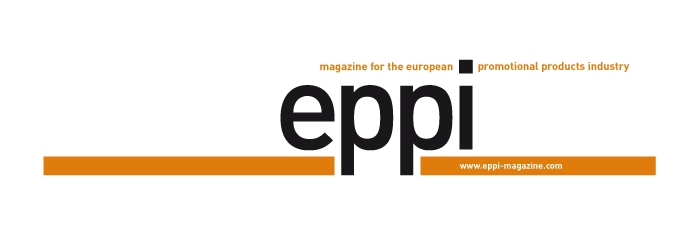More and more companies are taking on the role of sponsors in the esports sector. Those, who do it right, are warmly welcomed within the community by the fans. But merely placing a few logos doesn’t suffice, successful campaigns score popularity points with authenticity and added value. About promoting companies and their attempts to get closer to a demanding, but promising target group.
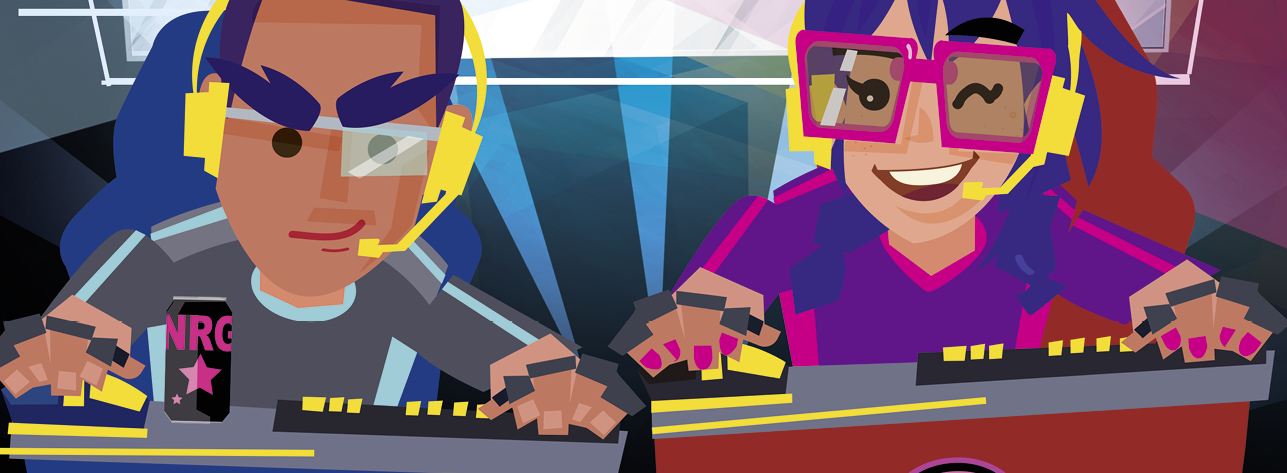
The hall is full, the atmosphere fantastic, one can see expectant faces. Posters are being waved, people are hopping around and dancing – it is almost like at a concert of a pop star. A group of young men wearing yellow T-shirts and yellowframed sunglasses are behaving in a particularly noticeable way. They are standing in the ranks and chanting with the fervour of true fans over and over the same three letters in English: “DHL! DHL! DHL!” In the crowd posters (evidently professionally produced and distributed) bearing the slogan “DHL” pop up. Indeed, they really are referring to the logistics service provider, DHL. This is not a wild vision of a DHL marketer that has gone a bit haywire, it actually did happen, namely at the ESL One, which was staged in the early summer of 2019 in the Birmingham arena. Anyone, who doesn’t believe this, can watch it in a video on YouTube that has been proudly posted by DHL.
The ESL One is one of the largest, international esports competition series in the world, organised by the Cologne-based company Electronic Sports League, ESL for short. In esports competitions, individual players or whole teams compete in sport simulations such as the well-known FIFA series, in multiplayer strategy games like League of Legends (LoL) or Dota 2, but also in tactic shooting games such as Counter Strike: Global Offensive (CS:GO). The competitions are staged at live events, in leagues, at tournaments or also online. Esports is different to gaming: Gaming describes the simple playing of electronic video games, esports are gaming competitions that are subject to competition rules. In addition to the amateur area, semi-professional and professional esports players have been on the increase for a few years. Around 10% to 14% of the Brits, Germans and French, as well as even 23% of the Italians and Spaniards regularly follow esports competitions online, according to the 2019 Deloitte Survey, Let’s Play! The same survey states that the esports market reached a volume of around 240 mil. Euros in the year 2018, which corresponds to an annual growth of 24% since 2016. In 2023, the European market will have reached the size of 670 mil., according to estimates by Deloitte – this would correspond to an annual growth of 23%. The largest growth driver: the sponsors.
For instance, 300,000 US dollars of prizemoney was up for grabs in total at the tournament in Birmingham. The team who came first walked off with 125,000 US dollars alone. The recent announcement that the Fortnite World Championships 2019 was endowed with 30 mil. US dollars in prize-money also caused a stir. The International Olympic Committee was still sceptical regarding esports at the end of 2019 and would in future only approve games and tournaments that are based on sports like football or basketball, if more actual movement came into play via virtual reality elements. On the other hand, more and more companies are gathering facts, treating esports like normal sports and are becoming sponsors – just like the frantically cheered on DHL at the ESL One.
Dynamic development
Michael Heina hasn’t experienced such enthusiasm for a sponsor as in Birmingham before either. Heina is Head of Esports Europe at the research & consulting company, Nielsen Sports. He has been working in the industry for around ten years. “Anyone, who has the feeling that esports are currently going through the roof, are completely right,” the expert stated: “This is noticeable alone from the large amount of new sponsoring deals within the industry.” Nielsen Sports analyses the economic developments in the so-called esports ecosystems worldwide – i.e. the entire industry comprising of tournament organisers, teams, leagues, game publishers, media as well as the esports fans and the sponsors themselves – and the figures really are impressive. Whereas Nielsen Sports counted just 73 esports sponsoring deals worldwide in the year 2015, the number of deals increased up to around 750 in the year 2018. As if this wasn’t enough: In the first half of 2019 alone, Nielsen Sports had already counted over 1,170 deals. Of course, Heina did add that not every deal is a million-dollar contract, nor does it necessarily represent a long-term commitment, but even cautiously assessed it can be stated that “The market is really moving at the moment, it is experiencing an incredible dynamic development.” A dampener that doesn’t even stop at the virtually contactless pastime of esports: The Corona crisis could curb the exponential growth of the past five years and revise downwards the predicted figures for this year. According to the news platform esports.com, at the end of March The Modern Times Group (MTG), the Swedish parent company of the Electronic Sports League and of the international tournament series, Dream-Hack, announced estimated losses in turnover of between 35% and 40% for the first six months of 2020. The organisers of large esports tournaments had to cancel the events, postpone them until next year or offer a purely online event instead. The largest gaming trade show in the world is only taking place virtually this year as well.
However, the biggest strength of the discipline, which distinguishes esports from classic types of sports is underlined here: It fundamentally takes place in the digital world on a nocontact basis, so that purely online events don’t involve any profound changes. An analysis of the ISPO (International Trade Show for Sporting Items and Sport Fashion) indeed underlines the role of major events as multipliers, but also stressed that in terms of sources of revenue for esports it is principally about reach – which is significantly higher online than offline. For example, in 2019 the League of Legends World Championship Finals in China recorded 40,000 visitors on-site, whereas approx. 100 mil. fans followed the games online and thus further fuelled the growth of esports.
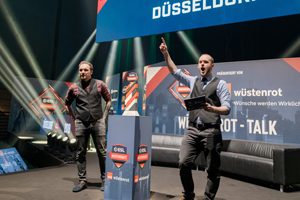
“Hello, we are Wüstenrot”: the German savings bank has been the main sponsor of the ESL Championships since 2016.
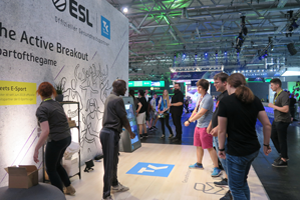
Sports and games: the TK is literally activating the target group with dances from the Fortnite game.
Generation gamer
Christopher Flato, press officer of the organisers ESL, has a relatively simple answer to this question: The target group is becoming increasingly more difficult to reach using other, classic means. “Millennials, digital natives, generation Z – the groups that are referred to by these keywords hardly utilise the classic media, but overall, they are a pretty exciting target group for a range of different sponsors and this target group is more and more interested in esports.” It by no means merely comprises of gaming teenies, but rather of young adults, mostly men that as well as having an above average education level, also boast significant buying power. This technology-savvy target group wants to see authentic commitment and it wants recognition. “Gamers – and most esports fans are also gamers – have been greatly mocked, were branded as being nerds. Successful sponsors give this target group the feeling that they are understood and grants them recognition – and they receive positive feedback in return,” explained Flato.
A consumer survey that Pricewaterhouse- Coopers (PwC) carried out in July 2019 shows how friendly esports fans are towards sponsors: The overwhelming majority of the esports fans questioned consider it an enrichment that nonendemic (in the survey: “classic”) companies are asserting themselves in the field of esports. The esports fans interviewed in this survey don’t even find advertising on merchandising items bothersome, although advertising in the games themselves is considered to be annoying. At events the fans enjoy getting to know the products and services of the sponsors – a curiosity which according to a PwC survey carried out in 2018 the promotional products of the sponsors significantly contribute towards.
Sales market for haptic advertising
Hence, Gary Moore from the British promotional products agency, Touch of Ginger, is also convinced of the potential of esports as a sales market for haptic advertising: “The figures clearly speak for themselves: The exponential growth of the last years, the young target group and the almost unlimited opportunities of the online and live communication via haptic advertising – from premium gifts for individual players, to merchandising for esports teams, through to give-aways for events – turn esports into an extremely interesting field for the promotional products industry.” Touch of Ginger specialises in consulting and in the tailor-made implementation of advertising gifts in the premium sector and has already realised many projects for brands from the sports and automobile areas. The British company has also been working together with organisations from the esports segment, such as Esports Awards, and designed among others the trophies for the eponymous international awards showcasing top class performance in the esports industry. “We are present in an industry that boasts an incredible degree of internationality and enormous reach. Some esports disciplines could even top the recognition and popularity of traditional sports. From universities that can afford their own esports team, through to whole stadiums that are built for the events – esports are gaining huge significance,” stated Moore.
Authenticity is key
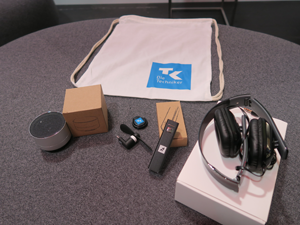
For the Gamescom give-aways, the German health insurance company TK relies on gadgets.
Michael Heina is also convinced of this. According to the expert if esports sponsors go about it right, they can expect a ROI of between 10:1 and 20:1. In comparison: In conventional sports sponsoring the ratio currently lies at between 3:1 and 5:1, according to Heina. One could thus say that sponsors are charging at an open door in the case of esports to the advantage of both parties concerned. However, the ways of how to get through the door do vary. Some companies enter a partnership with a league organiser, certain tournament or an esports team – that are referred to as “clans” within the scene – others fit whole teams out with a company logo. For instance, the German savings bank, Wüstenrot, has been the main sponsor of the ESL Championships – a sort of German premium class for the disciplines LoL, CS-GO and Playerunknown’s Battleground, since 2016. “In 2015, our recognition level among the young target groups was unsatisfactory, we had to urgently address the situation,” reported Clemens Kaiser, who in his capacity as Brand Manager is among others responsible for the strategic and operative brand alignment. The set goal was to reach the much-cited Y and Z generations more efficiently. Different channels were debated, Wüstenrot ultimately opted for esports. “Of course, there was a certain amount of risk involved and us entering the esports market came as a surprise to many people. We were the first non-endemic company to engage in such a comprehensive commitment and that as a finance service provider. Our aim is to increase our brand recognition and brand affinity. Our primary goal is not to sell building loan contracts at esports events, instead our intention is to reach the relevant set of the target group so that they remember us in a few years’ time when it comes down to their finances,” stated Kaiser.
So, always keeping a close eye on the target group, Kaiser and his colleagues set to work. Esports fans are open to sponsors and their activities, but commitment and authenticity are very important, explained the esports expert, Heina. A simple logo placement alone doesn’t lure a single esports fan away from the screen. Kaiser agrees: “One simply can’t go to an event, place logos and then wait for people to ask for a building loan flyer. One has to seriously occupy oneself with them and their sport.” And that is not easy at all, as Moore explained: “We may have many years of experience in dealing with the big players from the sports sector, we did nevertheless still encounter several hurdles when we moved into the esports market. Esports teams and companies often act outside the box of the classic structures – suddenly one is sat opposite very young decision-makers, who have a totally different background and different approaches. As promotional products consultants we recommend clear, particularly creative, playful solutions here. Whereby the product doesn’t necessarily have to be new – one can also earn popularity points in the esports world with classic merchandising from caps to shirts and accompany campaigns in a practical manner. But the implementation has to be tailor-made and authentic.”
Go for goal
For Wüstenrot this means: taking action themselves. At the finals of the ESL Championships for instance the building society built a gaming room – a room with a comfortable sofa and consoles, where the visitors could play trendy games and simply have a good time, as Kaiser reported. There were no building loan flyers lying around, but the logo was present everywhere. Influencers talked with professional esports players on-site in the scope of the Wüstenrot Talk about how one becomes an esports professional and how one exactly does one’s own thing; the word building loan contract hardly dropped into the conversation: “That was the first stage of our commitment: Hello, by the way we are Wüstenrot and we are here to support your passion.” Together with an agency, Kaiser and his team developed a quiz, which allowed the fans to impress with their knowledge on esports. Interspersed therein: Questions on the theme living. “None of them are complicated legal questions, more a case of ‘What is a rent index?‘,” Kaiser pointed out. An influencer from the scene also designed a studio for the building society once and naturally reported about it on Twitter and YouTube.
All activations at the Championships are accompanied by live coverage with influencers and are marketed via the social media. “On-site we reach a few thousand, but online one reaches over two million spectators during the ESL Championships,” commented Kaiser. Following the same principle, Wüstenrot also actively twittered about the ESL Championships under the name Wüstenrot4Gamers and in this way made a name for itself within the community. That is one of the special things about the esports fans: They don’t hesitate to say when they don’t like something – but also give a very fast positive reaction if a campaign is good. And what’s more not only online: Wüstenrot had a claim printed on gym bags and in the meantime the visitors of previous events keep on turning up at the tournaments with precisely these bags.
So, things are running nicely for Wüstenrot. “We were already able to record a significant increase in our brand values,” explained Kaiser. The brand recognition rose by twelve percent, not only among the core target group gamers, but also among young adults in Germany in general – so there was a spill-over effect. The current goal is to retain the values reached. The commitment of Wüstenrot is so successful because in addition to recognition it also offers the fans real added value. Companies that can’t offer added value, shouldn’t even start getting involved. What the added value comprises of, always depends on the company in question, the esports expert Heina said: “Sponsors can only be successful if they bring their respective core competence into an esports context and thus create precisely the added value that is so important for the fans.” DHL – the hailed sponsor – succeeded in doing so by having the warehouse robot, Effi-BOT, “deliver” give-aways and goodie packages. The robot followed famous esports presenters, flashed innocently in humanised cuteness and did exactly what it was constructed for: Delivered things. “Furthermore, DHL produced an in-game video clip aligned for the game Dota 2 and thus provided a prime example of how a brand can successfully activate its target groups,” specified Heina.
No greens for gamers
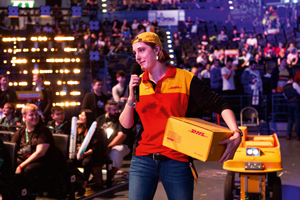
DHL and the Effi-BOT went down well with the audience at the ESL One Birmingham.
Not selling, but instead getting one’s message across to the target groups is the approach of the German health insurance company, Techniker Krankenkasse (TK). For the coming two years, the TK is the health insurance company of the ESL in Germany. In the scope of the cooperation that was initiated in June 2019, the focus is to be placed on the promotion of the mental and physical state of the players and fans. “The cliché of the small, fat, pale deprived child sat in front of a PC isn’t correct,” said Bruno Kollhorst, Director Advertising & HR Marketing at the TK. Gaming is meanwhile part of the everyday culture of many insurance holders and the TK asserts itself for a healthy way of dealing with this. The means the TK selected to do so is a combination between on-site activation and online content. The important thing is: All of this has to take place at eye level. “Nobody wants a health insurance company running through the ranks at a tournament wagging its finger and distributing carrots to the gamers,” Kollhorst said pointedly. Instead the TK relies on movement and games on-site at the tournaments. At the Gamescom 2019 for instance, a coach at the TK stand turned the popular dances from the game Fortnite into a small fitness programme together with the visitors. The health insurance firm relies on goodies as a reward here: People, who take part in such campaigns, are given branded give-aways that fit in with the gaming environment: “We selectively chose give-aways that were suitable for the Gamescom.” According to Kollhorst the offer went down very well at the Gamescom overall, the TK didn’t come across as being disruptive: “That was important to us. We didn’t want to just place our logo at an event, but indeed offer the visitors additional content with our stands and campaigns. For us it is about coming into contact with gamers and conveying the theme healthy living to them in a casual way.”
At present, many stakeholders want to get into contact with gamers via esports. So, some voices are already urging companies to hurry. For example, Toan Nguyen, Partner at the advertising agency JvM/sports, who described and warned about the costs for waiting too long in an article for the marketing medium Horizont: “Esports fans and their community are still brand-friendly – but that won’t be the case for ever.”
// Klara Walk, Claudia Pfeifer
Photos: Klara Walk (2), © WA Media; Stephanie Lieske (1), Viola Schuldner (1), © ESL




